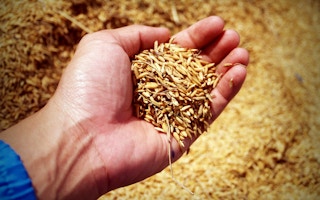Global warming could bring a serious problem for the two billion people on the planet who depend on one grain for their staple diet: less nutritious rice to sustain them. Scientists have found that rice grown at higher levels of carbon dioxide has an overall lower nutritional value.
The grain contains lower levels of protein, and iron and zinc—metals vital for health in trace form—and also consistent declines in vitamin B.
This finding is not based on computer simulation of a plant’s response to notionally higher atmospheric levels of the greenhouse gas CO2, nor on laboratory studies under glass and in artificial conditions. It is based on open air field trials.
That is, extra carbon dioxide is piped to the plants to mimic the ratios expected at the end of the century as ever more people burn ever greater quantities of fossil fuels. And it has been tested in many locations in rice-growing countries over many years.
The finding remains true—although at different levels of impact—for the 18 varieties or hybrids of rice tested so far.
Ten nations depend upon rice for daily food supplies. The people most likely to feel the consequences of reduced nutritional support—and these include impaired cognitive development, a feebler immune system, obesity and diabetes—are likely to be those who are poorest. The researchers estimate that 600 million people for whom rice provides more than half their daily diet could be affected.
“
For those populations that are highly rice-dependent, any CO2-induced change in the integrated nutritional value of rice grains could disproportionately affect human health.
Scientists from China, Japan, the US and Australia report in the journal Science Advances that they began their research, using what they call the technique of free air carbon dioxide enrichment, in 1998, to recreate what they expect to be the conditions under which farmers will grow crops a few decades from now.
They found on average that the test rice had 10 per cent less protein, 8 per cent less iron and 5.1 per cent less zinc compared with rice grown by farmers under existing conditions. There were also declines of 17 per cent in the vitamins B1 (thiamine) and of more than 16 per cent in vitamin B2 (riboflavin). Vitamin B5, or pantothenic acid levels, were down more than 12 per cent. Folate or vitamin B9 levels were down 30 per cent.
“People say more CO2 is more plant food—and it is. But how plants respond to that sudden increase in food will impact human health as well, from nutritional deficits, to ethnopharmacology, to seasonal pollen allergies—in ways we don’t yet understand,” said Lewis Ziska, a plant physiologist with the US Department of Agriculture research service, one of the authors.
Hungry billion
Up to a billion people in the world are what bureaucrats politely call “food insecure.” There has already been concern about the impact of higher levels of carbon dioxide on protein in potatoes, maize and other cereals.
As global temperatures rise in response to ever greater levels of CO2 and other greenhouse gases in the atmosphere, harvests of all the staple cereals could in any case decline—sometimes as a response to ever wilder extremes of heat, rain and windstorm—by between 20 and 40 per cent. But so far, there has been little research on the impact of climate change on the nutritional qualities of each staple.
The study puts the case more coolly: “For those populations that are highly rice-dependent, any CO2-induced change in the integrated nutritional value of rice grains could disproportionately affect human health.” And the scientists end their study by saying:
“Overall, these results indicate that the role of rising CO2 on reducing rice quality may represent a fundamental, but under-appreciated, human health effect associated with anthropogenic climate change.”
This story was published with permission from Climate News Network.










